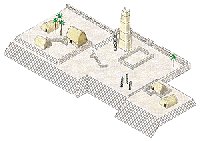since all appeared to have linked temple construction to economic, political and ritual development."
Maui's Oldest T
 emple, Pi'ilanihale Heiau, named for its famous Chief Pi'ilani, has now been dated to 1214 and is 400 years older than previously thought. It measures larger than a football field and stands 12 meters in height.
emple, Pi'ilanihale Heiau, named for its famous Chief Pi'ilani, has now been dated to 1214 and is 400 years older than previously thought. It measures larger than a football field and stands 12 meters in height.Archaeologica (link at right) has an interesting article from Discovery News on this temple and what it reveals about the Polynesian past.
Here are some highlights of the article:
"The most elaborate temples featured altars, oracle towers, offering pits, palisades, drum houses, and god or ancestral images carved from wood or stone."
"At some events there would have been human sacrifice, the killing of hundreds of pigs, the sounds of music and drumming, and the smell of burning fires."
"Members of the chiefly class were allowed into sacred areas of the temples, but they had to get in prostrate positions or lie down, sometimes for hours, as a sign of submission and respect for the chief."
Interesting stuff! By the way, James Michener's Hawai'i is quite well researched and offers a fascinating description of early Hawaiian (and Polynesian) culture and life right on up to the "colonizing" by Christian missionaries and the overthrow of the Hawaiian monarchy by US businessmen, descendants of these missionaries.
Question: Does anyone know where the name Hawai'i comes from?